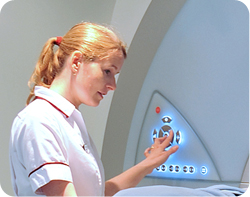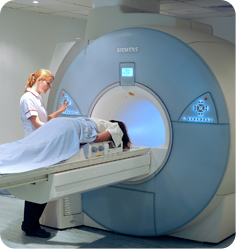Breast Unit
MRI Scan
Breast MRI

Radiographer Sharon Pallister preparing the breast MRI
In addition to triple assessment, breast MRI (Magnetic Resonance Imaging) has a useful role in selected cases as a problem-solving tool to help diagnose breast cancer or to give further information.
MRI does not involve x-ray irradiation but uses a very strong magnetic field. It requires specially trained radiographers to perform the test and takes 45-60 minutes. All breast MRI examinations are double read by experienced breast dedicated radiologists.
It is most often used to give further information following a mammogram and ultrasound. In many cases, an additional breast ultrasound is performed after the MRI to clarify its findings. It is sometimes used to assess the response of a cancer to chemotherapy or hormone treatment prior to surgery.
In addition to its role as a diagnostic tool, breast MRI is useful in screening younger women at a significantly increased risk of breast cancer either as a result of a very strong family history or a mutated breast cancer gene (BRCA1 or BRCA2), or following chest mantle irradiation for Hodgkins disease at a young age. MRI is often helpful for these women because it is effective in dense breast tissue and many young women have dense breasts.
However, mammography and ultrasound remain the most useful diagnostic breast imaging methods and even where MRI is recommended for women at high risk of the disease, it is used in conjunction with mammography and ultrasound for selected women.

Radiographer Sharon Pallister with
patient having a breast MRI
When Will my Results be available?
Breast MRI is a very specialised technique and the results take longer to process.
If the test has been performed for a suspicious or known breast cancer, you will be given an appointment to return to the clinic to discuss your results with a specialist.
If the Breast MRI is arranged as part of a screening procedure, then the results are sent by post to your GP or referring specialist within 4 weeks.
Following the Breast MRI examination, many patients are called back for a further ultrasound of the breast as this helps the radiologist to interpret the MRI findings. This is known as a "second look ultrasound"

